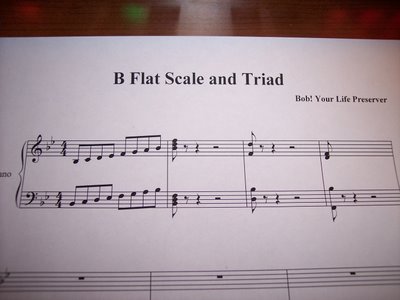B Flat Major Blog!
 My son Clark called me the other day to share with me a website he heard about while commuting to work and listening to NPR. It was all about "B Flat" (Bb?) the note one and a half tones below "middle C". He plays guitar and sings to his son and knows that, when tuning, this is next to the highest string (B) and it can go flat. I was curious, so after some searching on (mpr...etc.) I found the site and "Krulwich on Science" which was mentioned on the "Morning Edition" Feb. 16, 2007
My son Clark called me the other day to share with me a website he heard about while commuting to work and listening to NPR. It was all about "B Flat" (Bb?) the note one and a half tones below "middle C". He plays guitar and sings to his son and knows that, when tuning, this is next to the highest string (B) and it can go flat. I was curious, so after some searching on (mpr...etc.) I found the site and "Krulwich on Science" which was mentioned on the "Morning Edition" Feb. 16, 2007During World War II, the New York Philharmonic was visiting the American Museum of Natural History. During rehearsal, somebody played a note that upset a resident live alligator named Oscar. Oscar suddenly began to bellow. Naturally, with so many scientists in residence, an experiment was quickly devised to see how to get Oscar to bellow again. After numerous musicians tried, it was found that B flat, one octave below middle C was the sound that set him off. That was back in the 1940's. Robert Krulwich repeated the experiment on an ABC News broadcast in the 1990's, playing a B flat to a collection of gators at a roadside attraction in Florida and recorded their bellows. Maybe a mating call? Or "male bonding"?
In September, 2003, astronomers at NASA's Chandra X-Ray Observatory found what can be described as sound waves emanating from a supermassive black hole. This black hole can be seen in the Perseus cluster of galaxies located 250 million light years from Earth. Andrew Fabian of the Institute of Astronomy of Cambridge, England, analyzed the waves and announced, "We have detected their sound..." The sound he found (which is really the waves passing through gas near the black hole) translate to the note B flat. But this is not a B flat you or I can hear. It is 57 octaves below middle C. A piano, by comparison, contains only seven octaves. So, if a black hole hums, it hums at a frequency a million billion times lower than we can hear. Talk about "music of the spheres"... This is also how elephants communicate great distances, I've heard...Bb?
I did alittle checking myself in the past few days and found that most of the songs us "barbershoppers" like to sing are in the key of B flat. (as you see above) It has two flats, B and E. My part, the "lead" usually doesn't start on B flat but on the 3rd or 5th above the the "tonic". They are called the "mediant" and the "dominant". In harmonic singing, i.e. barbershop, it is important to "hear" these intervals, also the "leading tone" (7th) which usually resolves to the "tonic" (Bb) "Woodshedding" is a "BS" term for making it up as you go (adlibbing) with 3 other singers i.e. the Bass, Tenor and Baritone. You have to "sing" with your "ears". My favorite songs that are in the key of Bb are: "My Wild Irish Rose" (lead on F), "Let Me Call You Sweetheart", "Shine on Me", "Sweet Adeline" "The Old Songs" (S.P.E.B.S.Q.S.A. Theme Song) "In The Good Old Summer Time" etc. (36 of more than 50 I know, are in Bb) The first time I was asked to sing "barbershop harmony" was as a freshman at a North Park College "Gym Jam" (Fall mixer 1957) They needed a baritone. We sang "...while strolling in the park one day". My first job teaching 5th grade in Pasadena at Allendale Elementary was partly due to my baritone voice and the three other men on staff (including the boss/principal) who needed a 4th part. We sang, "...nothing could be finer than to be in Carolina..." I just visited our BS leader in the hospital...and sang him one of his/my favorites...probably in Bb "Thank You, Dear Lord". He is also a retired teacher from the Redlands area. He sang with the "Roger Wagner Chorale" back in the day. Efraim Soto welcomed me to "VLQ" group six years ago. He and his great brother Chechi are great to sing with.
A musician friend of mine just told me today that they used to tune their instruments to the "hum" of the florescent lights in the band room...Bb. I'm betting that the famous movie "Close Encounters of the Third Kind"...had that 5 note communication with the "aliens" and the octave jump was...Bb's. What do you think? Am I reaching a bit? Or just Bobbing from Bb to Bb? I wonder why they never call it A#? Bob!

0 Comments:
Post a Comment
<< Home